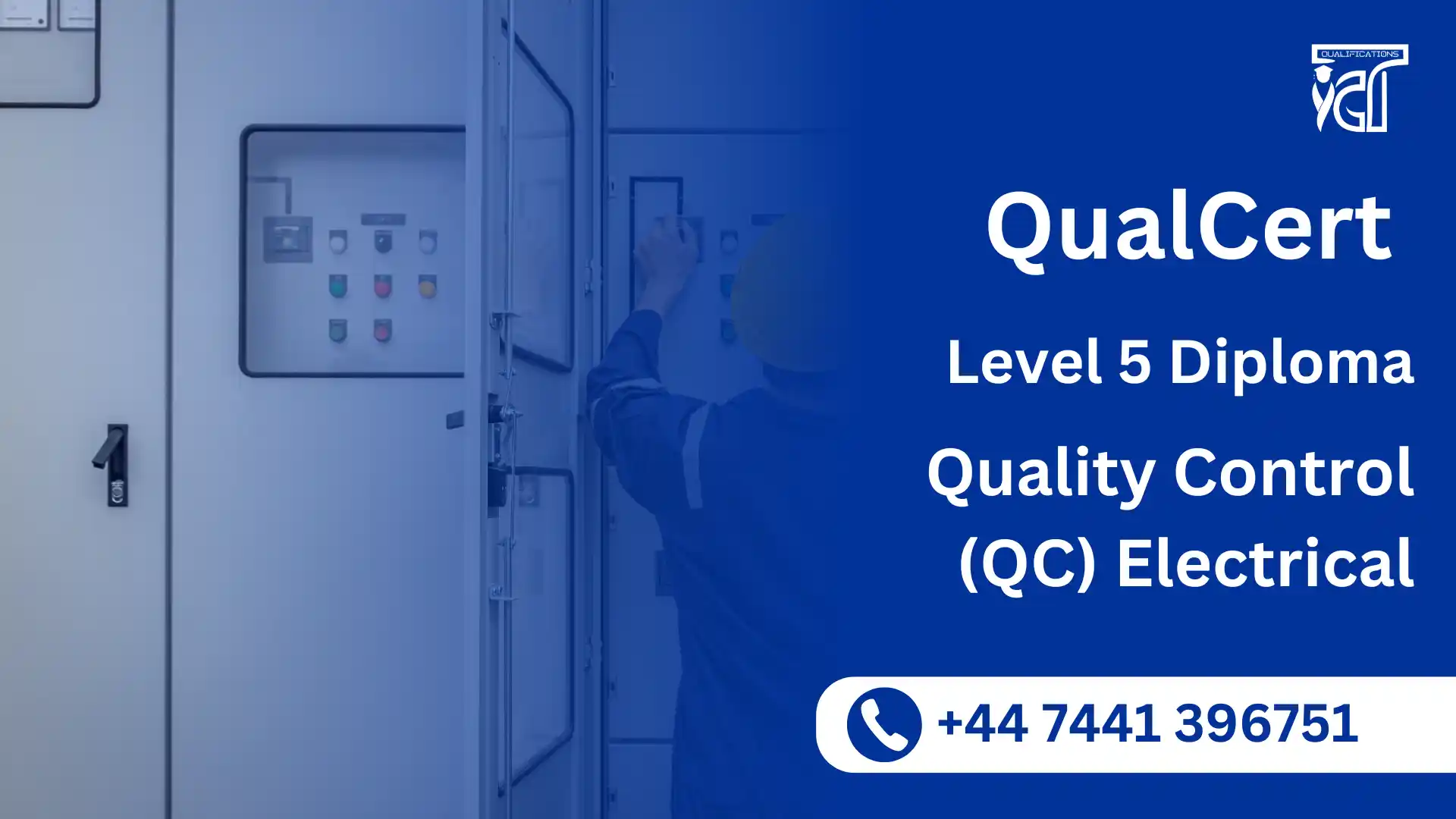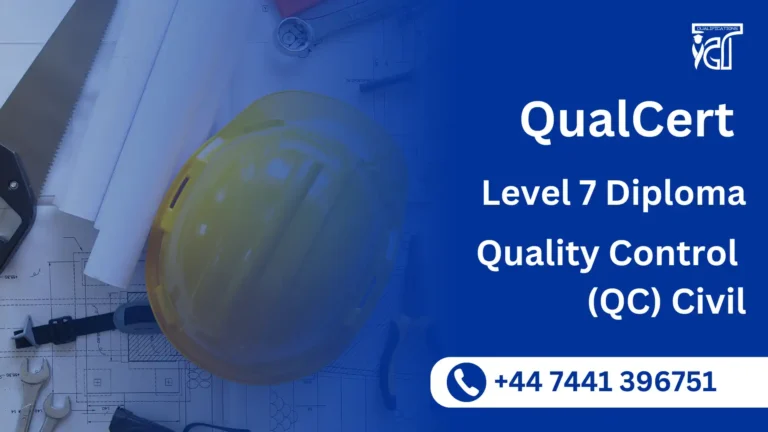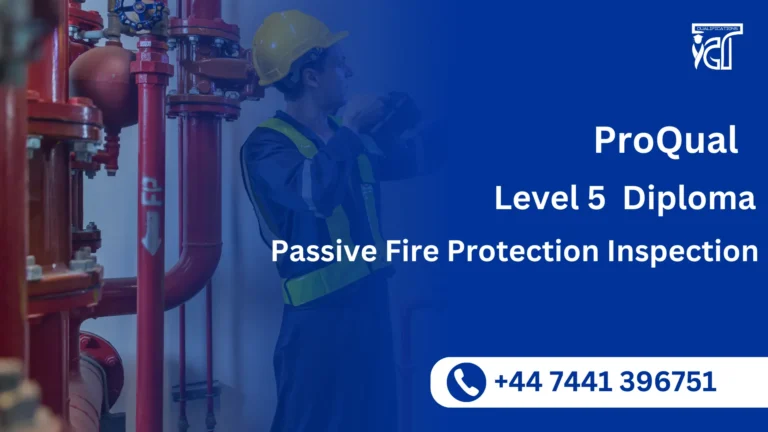The QualCert Level 5 Diploma in Quality Control (QC) – Electrical is a career-focused qualification designed to develop essential skills and knowledge for individuals working in or aspiring to enter the field of electrical quality control. This diploma equips learners with the practical tools needed to inspect, test, and ensure compliance of electrical systems with industry standards and safety regulations.
The course provides a strong foundation in quality control principles, electrical testing techniques, calibration practices, and health and safety procedures. Learners will also gain insight into documentation, reporting, and compliance processes that are critical for maintaining high-quality electrical installations and operations.
Ideal for technicians, junior engineers, and quality control assistants, this diploma prepares individuals for quality-focused roles across various sectors, including construction, manufacturing, power distribution, and industrial automation.
QualCert Level 5 Diploma in Quality Control (QC) Electrical
The QualCert Level 5 Diploma in Quality Control (QC) Electrical comprises several study units designed to provide learners with a comprehensive understanding of QC principles and practices in the electrical sector. Below is the qualification structure, including the Total Qualification Time (TQT) 600, Guided Learning Hours (GLH) 360, and 75 Credits associated with the program.
| Unit Ref# | Unit Title | Credit | GLH | TQT |
| QC100011 – 1 | Advanced Quality Control for Electrical Systems | 15 | 60 | 200 |
| QC100011 – 2 | Electrical Circuit Inspection and Testing | 15 | 60 | 200 |
| QC100011 – 3 | Calibration, Measurement, and Testing | 15 | 60 | 200 |
| QC100011 – 4 | Managing Electrical Quality Assurance Projects | 15 | 60 | 200 |
| QC100011 – 5 | Health, Safety, and Environmental Management | 15 | 60 | 200 |
| QC100011 – 6 | Electrical Quality Control Reporting and Documentation | 15 | 60 | 200 |
GLH (Guided Learning Hours) and TQT (Total Qualification Time) are terms commonly used in vocational qualifications to help define the amount of time a learner is expected to spend on their studies.
1. GLH (Guided Learning Hours)
GLH refers to the number of hours a learner spends being directly taught, supervised, or supported during their course. This includes the time spent in activities such as:
- Classroom instruction
- Practical workshops
- One-on-one tutoring or mentoring sessions
- Online learning sessions with tutor support
In other words, GLH represents the time that learners are actively engaged with their instructors or learning activities.
2. TQT (Total Qualification Time)
TQT represents the total amount of time a learner is expected to invest in completing a qualification, including:
- GLH (Guided Learning Hours): Time spent on direct learning, as explained above.
- Self-Directed Learning: This includes time spent on independent study, research, assignment completion, preparation for exams, and any other work the learner does outside of direct teaching hours.
TQT is a broader measure that includes all the time required to achieve the qualification. It helps learners and employers understand the overall commitment required for the qualification.
Key Differences Between GLH and TQT:
- GLH focuses on direct learning with guidance or supervision.
- TQT includes GLH as well as independent study time and other learning-related activities.
Example:
If a qualification has a TQT of 600 hours and a GLH of 250 hours, it means the learner should spend 250 hours in direct learning (classroom, online, or tutor-led sessions) and 350 hours on independent study or research.
Advanced Quality Control for Electrical Systems
- Apply advanced quality control techniques to monitor and improve electrical system performance.
- Assess system functionality using industry-recognized evaluation methods and tools.
- Identify and resolve common quality issues to enhance reliability and regulatory compliance.
- Implement best practices for the maintenance and continuous improvement of electrical systems.
Electrical Circuit Inspection and Testing
- Perform detailed inspections and functional testing of electrical circuits and components.
- Detect faults, defects, and safety risks within electrical systems using structured procedures.
- Apply appropriate testing standards to ensure circuits meet performance and safety criteria.
- Accurately document findings and prepare reports for quality reviews and audits.
Calibration, Measurement, and Testing
- Understand the core principles behind accurate calibration and measurement in electrical systems.
- Operate specialized equipment to calibrate instruments and verify their accuracy.
- Evaluate measurement reliability and ensure precision in testing processes.
- Conduct routine checks and maintenance on measuring tools to uphold testing integrity.
Managing Electrical Quality Assurance Project
- Plan, coordinate, and execute quality assurance initiatives within electrical projects.
- Define project goals, timelines, resources, and compliance checkpoints.
- Track progress, maintain records, and ensure alignment with established quality standards.
- Lead project teams, resolve quality challenges, and foster continuous improvement.
Health, Safety, and Environmental Management
- Integrate health, safety, and environmental (HSE) practices into electrical work environments.
- Conduct risk assessments and apply mitigation strategies to prevent electrical hazards.
- Ensure adherence to relevant laws, codes, and environmental regulations.
- Promote safety culture and environmental responsibility throughout project lifecycles.
Electrical Quality Control Reporting and Documentation
- Prepare professional reports detailing quality control processes, findings, and outcomes.
- Maintain clear and organized documentation for auditing and regulatory compliance.
- Communicate inspection results and corrective actions through structured reporting methods.
- Implement effective record-keeping systems to support ongoing quality assurance efforts.
ourse Benefits
Pathway to Higher Education
Use this diploma as a stepping stone to Level 6 or Level 7 qualifications in Quality Control, Engineering Management, or related specializations.
Foundational to Advanced QC Skills
Build a solid foundation in quality control principles and progress to advanced inspection, testing, and reporting techniques specific to electrical systems.
Career Advancement Opportunities
Enhance your qualifications for roles such as Electrical QC Inspector, QA/QC Technician, Electrical Site Supervisor, or Testing & Commissioning Engineer.
Hands-On Technical Training
Gain practical experience in calibration, fault detection, circuit testing, and quality documentation—skills highly valued across multiple industries.
Compliance with International Standards
Learn how to apply and comply with global electrical standards (e.g., IEC, ISO), boosting your employability in both local and international markets.
Project and Team Management Skills
Develop the ability to manage electrical QA projects, coordinate teams, and maintain quality timelines from initiation to completion.
Improved Workplace Safety Awareness
Understand electrical hazards and implement safety and environmental controls aligned with regulatory requirements.
Professional Quality Reporting Techniques
Master quality control documentation and reporting methods that support clear communication, audit readiness, and stakeholder transparency.
Multi-Industry Application
Apply your skills across various sectors including construction, power generation, oil & gas, industrial manufacturing, and utilities.
Recognition and Credibility
Achieve a widely respected qualification that enhances your professional profile and demonstrates your commitment to quality and safety.
The QualCert Level 5 Diploma in Quality Control (QC) – Electrical is designed for individuals who are either beginning or advancing their careers in the electrical and quality control fields. This course is ideal for:
- Electrical Technicians and Junior Engineers
Individuals with foundational technical knowledge who want to build specialized skills in quality control and inspection. - QA/QC Assistants and Inspectors
Professionals already working in quality control roles who wish to formalize their knowledge and progress to supervisory or specialist positions. - Site Supervisors and Foremen
Those responsible for overseeing electrical installations who need structured knowledge of quality assurance practices and compliance standards. - Vocational and Technical Graduates
Learners who have completed a technical diploma or certification in electrical engineering and are seeking to expand their qualifications. - Maintenance and Testing Personnel
Individuals working in system maintenance, calibration, or testing roles who want to enhance their quality management capabilities. - Career Changers from Related Technical Fields
Professionals in mechanical, instrumentation, or industrial technology sectors looking to transition into electrical quality control. - Health and Safety Personnel in Electrical Projects
Safety officers seeking to deepen their understanding of electrical systems to better assess quality-related risks and enforce safety standards.
Entry Requirements
Register Now
Qualification Process
Qualification Process for the QualCert Level 5 Diploma in Quality Control (QC) Electrical
- Self-Assessment:
Begin by evaluating your eligibility to ensure you meet the qualification requirements, including work experience, knowledge, and language proficiency. - Registration:
Complete your registration by submitting the required documents, including a scanned copy of a valid ID, and paying the registration fee. - Induction:
An assessor will conduct an induction to confirm your eligibility for the course and explain the evidence requirements. If you do not meet the criteria, your registration will be canceled, and the fee will be refunded. - Assignmnets & Evidence Submission:
Provide all assignmnets and the necessary evidence based on the assessment criteria outlined in the course. If you are unsure of the required evidence, consult with the assessor for guidance on the type and nature of evidence needed. - Feedback and Revision:
The assessor will review your submitted evidence and provide feedback. Evidence that meets the criteria will be marked as “Criteria Met,” while any gaps will be identified. You will be asked to revise and resubmit if needed. - Competence Evidence:
Submit final evidence demonstrating that all learning outcomes have been met. This evidence will be marked as “Criteria Met” by the assessor once it is satisfactory. - Internal Quality Assurance (IQA):
The Internal Quality Assurance Verifier (IQA) will review your evidence to ensure consistency, quality, and compliance with standards. - External Verification:
The IQA will submit your portfolio to QualCert External Quality Assurance Verifiers (EQA) for final confirmation. The EQA may contact you directly to verify the authenticity of your evidence. - Certification:
Upon successful completion of all checks, QualCert will issue your official certificate, confirming that you have attained the QualCert Level 5 Diploma in Quality Control (QC) Electrical.







